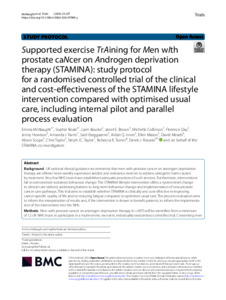MCNAUGHT, Emma, REALE, Sophie, BOURKE, Liam, BROWN, Janet E., COLLINSON, Michelle, DAY, Florence, HEWISON, Jenny, FARRIN, Amanda J., IBEGGAZENE, Said, INNES, Aidan Q., MASON, Ellen, MEADS, David, SCOPE, Alison, TAYLOR, Chris, TAYLOR, Steph JC., TURNER, Rebecca R. and ROSARIO, Derek J.
(2024).
Supported exercise TrAining for Men wIth prostate caNcer on Androgen deprivation therapy (STAMINA): study protocol for a randomised controlled trial of the clinical and cost-effectiveness of the STAMINA lifestyle intervention compared with optimised usual care, including internal pilot and parallel process evaluation.
Trials, 25 (1): 257.
[Article]
Documents
33579:640954
![[thumbnail of 13063_2024_Article_7989.pdf]](https://shura.shu.ac.uk/33579/1.hassmallThumbnailVersion/13063_2024_Article_7989.pdf)

Preview
Abstract
Background: UK national clinical guidance recommends that men with prostate cancer on androgen deprivation therapy are offered twice weekly supervised aerobic and resistance exercise to address iatrogenic harm caused by treatment. Very few NHS trusts have established adequate provision of such services. Furthermore, interventions fail to demonstrate sustained behaviour change. The STAMINA lifestyle intervention offers a system-level change to clinical care delivery addressing barriers to long-term behaviour change and implementation of new prostate cancer care pathways. This trial aims to establish whether STAMINA is clinically and cost-effective in improving cancer-specific quality of life and/or reducing fatigue compared to optimised usual care. The process evaluation aims to inform the interpretation of results and, if the intervention is shown to benefit patients, to inform the implementation of the intervention into the NHS. Methods: Men with prostate cancer on androgen deprivation therapy (n = 697) will be identified from a minimum of 12 UK NHS trusts to participate in a multi-centre, two-arm, individually randomised controlled trial. Consenting men will have a ‘safety to exercise’ check and be randomly allocated (5:4) to the STAMINA lifestyle intervention (n = 384) or optimised usual care (n = 313). Outcomes will be collected at baseline, 3-, 6- and 12-month post-randomisation. The two primary outcomes are cancer-specific quality of life and fatigue. The parallel process evaluation will follow a mixed-methods approach to explore recruitment and aspects of the intervention including, reach, fidelity, acceptability, and implementation. An economic evaluation will estimate the cost-effectiveness of the STAMINA lifestyle intervention versus optimised usual care and a discrete choice experiment will explore patient preferences. Discussion: The STAMINA lifestyle intervention has the potential to improve quality of life and reduce fatigue in men on androgen deprivation therapy for prostate cancer. Embedding supervised exercise into prostate cancer care may also support long-term positive behaviour change and reduce adverse events caused by treatment. Findings will inform future clinical care and could provide a blueprint for the integration of supervised exercise and behavioural support into other cancer and/or clinical services. Trial registration: ISRCTN 46385239, registered on 30/07/2020. Cancer Research UK 17002, retrospectively registered on 24/08/2022.
Actions (login required)
 |
View Item |



 Tools
Tools Tools
Tools